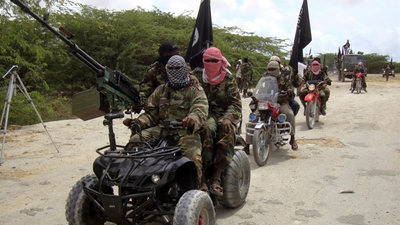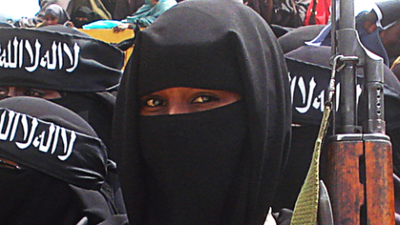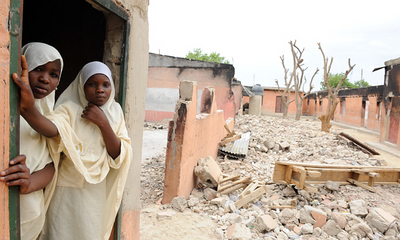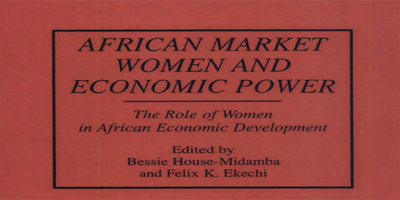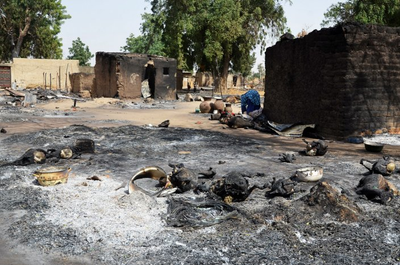Boko Haram Is Enslaving Women, Making Them Join the War – “They have a look in their eyes—they look like they are possessed,” says Amira, a Nigerian woman held captive by Boko Haram fighters for several years. “They would even drink the blood of the people they killed,” she adds, using her hands to tip an imaginary bowl of blood to her mouth.
Amira is in her mid-50s, and the signs of a life of hard agricultural labor show across her face and hands. (She asked Newsweek to identify her only by the pseudonym Amira because she fears reprisals.) She is dressed in clean but worn clothes, a long skirt and a head wrap. Leaning forward in her plastic lawn chair in the modest administrative office of a camp for internally displaced people, she describes how the young fighters of Boko Haram, some not even in their teens, ransack communities, rape young women and kill on a scale unseen in Nigeria since the country’s civil war in the 1960s.
Around three years ago, Amira fled from Michika, a town in northern Adamawa State, attempting to escape from Boko Haram. The area is one of the hardest hit by the Islamist insurgency, which has killed more than 30,000 people and displaced an estimated 2.2 million in just over six years. Because Amira and her neighbors were forced to flee at night, families were scattered, separated from one another as they ran for their lives. Amira lost track of her three children, and she fears at least one of them was killed that night. She had already lost her husband to Boko Haram.
When she came across a group of young men in khaki uniforms in the forest, she assumed they were the Nigerian military. “I trusted them when they told me to follow them.” That night, Amira was abducted by Boko Haram.
Shortly after she realized the men in uniform were not soldiers, they tried to rob her. “They tried to take my things, and I refused,” Amira says. “One man hit me, so I struck him across his face. He hit me on my head—look, you can still see the scar a bit,” she says, pulling off her head wrap and spreading her braids with her fingers to show the faded scar on her scalp. Haphazardly retying her headscarf, she continues her story: “ One of the lookouts saw them hit me and came down from his post to tell them to stop. He even applied ointment to my hair to help the bleeding. The men who tried to rob me then took him away and killed him. They made me watch them kill him.”
Amira also watched helplessly as her younger brother, who refused to join Boko Haram when he was captured, “was hacked to death.” She spent the next few years as a captive, forced to run errands for the insurgents and maintain their camps, while being shuttled across the country as the fighters fled the military and terrorized communities in northeast Nigeria. She saw hundreds of people hacked to death as Boko Haram raided villages across northeast Nigeria.
Amira is one of the thousands of women who have been abducted by Boko Haram. She says she was “too old to be a wife,” but most of the other abducted women were handed over to fighters as so-called wives and raped repeatedly. The group has also used girls and women as suicide bombers in more than 90 instances. No other insurgency in history has relied upon women and girls in such an abusive and predatory manner, so systematically, as Mia Bloom and I report in a forthcoming paper for the Center for Complex Operations online journal Prism. Although Nigerian President Muhammadu Buhari declared in late December that Boko Haram had been “technically” defeated, violence continues, and it will take many years for survivors like Amira to return to any kind of normal life.
For some men in Boko Haram, participation in the insurgency is “mostly about power and access to women,” says Kyari Mohammed, the head of the Peace and Security Center at Modibbo Adama University of Technology in Yola. “You can take anyone’s woman, and she is yours,” he says, adding that in a region with few economic opportunities that would allow a young man to court and maintain a wife, access to women has particularly strong appeal.
One man who lived in an area under the control of Boko Haram for a few months suggests that 60 percent of the “total Boko Haram population is female,” observing that many of the foot soldiers have multiple wives. Another man recounts how Boko Haram raided homes in his community, kidnapping women and “tossing 5,000 Naira [about $25] on the floor as a bride price” for the kidnapped girls.
Amnesty International estimated last year that the militants had abducted at least 2,000 women and girls, but the real number may be much higher. The U.N. secretary-general’s special representative on sexual violence, Zainab Hawa Bangura, said last year Boko Haram’s sexual violence was “not merely incidental, but integral, to their strategy of domination and self-perpetuation.”
Human Rights Watch recorded the account of a girl abducted for a month in 2013 who told researchers, “After we were declared married, I was ordered to live in his cave, but I always managed to avoid him. He soon began to threaten me with a knife to have sex with him, and when I still refused he brought out his gun, warning that he would kill me if I shouted. Then he began to rape me every night. He was a huge man in his mid-30s, and I had never had sex before. It was very painful, and I cried bitterly because I was bleeding afterwards.” The girl was just 15 at the time. According to Human Rights Watch, some reports have emerged that militants pray before raping women and girls, believing that any children born out of these unions will continue the jihad against the Nigerian government. The women who carry these children to term face violence and ostracism from their community, if they are lucky enough to escape from Boko Haram.
According to Amira, captive women are forced to cover themselves up and observe an extreme version of the Islamic notion of isolation, or purdah. “Women were allowed to go only to the Koranic school run by Boko Haram,” one man tells me in the dusty courtyard of the Maikohi displacement camp outside of Yola. “If they violated that, they would be punished. Their husbands could be punished too.” He still bears the scars across his back from being whipped by the insurgents. Amira, who is Muslim, recalls that all of the abducted women were forced to learn at least a few lines of the Koran. Shortly after her abduction, Amira recalls, the insurgents “made us all recite the Muslim articles of faith,” and killed some of those who were unable to do so.
Some of the women captured by Boko Haram take up arms. According to Amira, captives are often disciplined by young women known as Chibok girls. The name refers to the kidnapping of more than 200 schoolgirls from the town of Chibok by Boko Haram nearly two years ago, which sparked international outrage and calls for action under the banner of #BringBackOurGirls. The BBC reported in 2015 that during assaults on villages “people were tied and laid down, and the girls took it from there.… The Chibok girls slit their throats.” There is no proof that these girls were indeed the schoolgirls abducted from Chibok, but b y purporting to have turned the Chibok schoolgirls into cold-blooded killers, Boko Haram is furthering its campaign of psychological terror. Amira says the so-called Chibok girls in the insurgents’ camps “were trained as soldiers and given guns.”
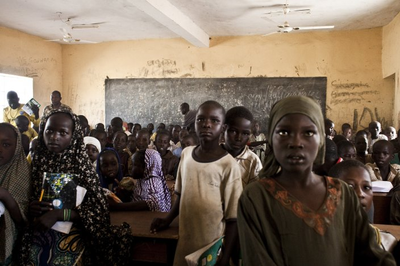
“If you were stubborn and refused them, they can kill you,” she says. Asked if she ever saw Chibok girls kill anyone, she gives an emphatic nod.
According to reports of those who escaped from Boko Haram, many of the abducted women have been subjected to indoctrination and forced to take part in acts of extreme violence. A handful of Nigerian soldiers I spoke with reported hearing female voices chanting during Boko Haram assaults on villages and when the military conducted raids against the sect. Many of them relayed tales of seeing women in burqas, with AK-47s—just like the male fighters. One soldier I met in a transit camp for internally displaced people said cavalierly, “There are female fighters in Boko Haram; there are fighters with weapons and plenty of suicide bombers.”
Boko Haram’s use of female suicide bombers is unprecedented in its scale. Sri Lanka’s Tamil Tigers, a militant group known for its female attackers, conducted 46 suicide bombings led by women over the course of a decade in the ’90s. Boko Haram has conducted more than 90 such attacks in a little over a year and a half, and have largely been against soft targets, such as markets that are filled primarily with civilians. When asked if she saw any young girls being used as suicide bombers, Amira merely nods , uncharacteristically quiet.
While it is possible that some of the female fighters in Boko Haram have joined of their own volition, the majority of reported female suicide bombers are described as young girls, who, like other child soldiers, would be considered as much victims as perpetrators. Many of the people I spoke with across northern Nigeria believe the girls in such attacks didn’t know that they were laden with explosives. One man in Yola waved his hand in the air, insisting, “They are too young! You know they are just girls. They don’t know what they are doing.”
Amira estimates that Boko Haram held her for several years, though it was difficult for her to keep track of time. She was first held in a prison the militants had overtaken near Michika; later, she was moved with her captors and lived in “underground bunkers” in the Sambisa Forest. Escape was her constant goal, but the punishment for attempting to flee was death. Amira recalls that the foot soldiers in Boko Haram “were always following people and killing them for leaving.”
The moment she’d been waiting for finally came last year. Amira heard the sounds of Nigerian security forces nearby and was able to run to a clearing in the forest and flag down the soldiers. Leaping from her chair, she waves her arms wildly to demonstrate how she flagged down her rescuers. With her help, the soldiers were able to free other captives too. T oday, she lives in the National Youth Service Corps camp for internally displaced people in Yola, where women outnumber men by a large margin.
As I walked through several such camps in the Adamawa region, one U.N. employee who accompanied me would periodically say, “Look at how few adolescent men there are here.” Women and children dominate the camps, bustling between tents, tending the communal kitchens, or just sprawling beneath trees in the camp courtyards. Women are often responsible for providing support to orphaned children; at another camp for displaced people in Mubi, in northern Adamawa, a woman sitting outside a small tent with two infants in her lap tells me that only one of the children is hers. “As we were fleeing Boko Haram, I saw a mother drop her child,” she says. “I picked her up, and I now take care of them both.”
If they return to the communities they fled, women like Amira face a myriad of challenges. Their homes may have been looted or burned to the ground, either by Boko Haram or by the Nigerian military in an attempt to prevent looting. The vast majority of the women were subsistence farmers prior to fleeing; for the many who are now widowed, the job of preparing, planting and harvesting their fields will be hard. Even worse, there are emerging reports of women being denied access to land and being rejected from their communities because they are widows. Rejection is all the more common for women who have been forcibly impregnated by Boko Haram fighters or whose family members are thought to be sympathetic to, or a part of, the insurgency.
Read more..(Courtesy News Week Nigeria)

